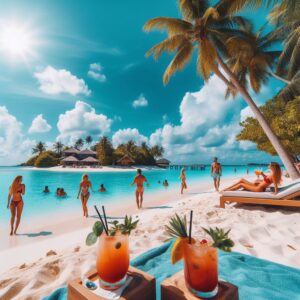From fear of missing out to joy of travel: How bucket lists are evolving
4 min readFor years, places like the Eiffel Tower in France, Times Square in the U.S., and the Leaning Tower of Pisa in Italy dominated checklists as travelers felt compelled to visit such global “must-see” places.
Social media amplified it, with heavily photographed landmarks becoming the ultimate FOMO (fear of missing out) trigger.
But the tide is turning.
The JOMO (joy of missing out) mindset encourages exploration off the beaten path. Travelers are seeking hidden gems that offer unique and intimate experiences. The focus has shifted toward tranquil, nature-focused destinations, including secluded beaches, charming villages, and serene hilltop retreats.
 |
|
A man trekking on top of a mountain peak in Mu Cang Chai in northern Vietnam. Photo by Nguyen Trong Cung |
The term JOMO originated circa 2012 and was popularized by American entrepreneur Anil Dash as a response to the pervasive FOMO. It emphasizes the joy of disconnecting from social obligations and digital pressures and finding contentment in opting out.
Platforms like Instagram and TikTok, which often amplify FOMO through posts and trends, also play a role in fostering JOMO through communities promoting wellness, minimalism, and digital detox.
Through hashtags like #DigitalDetox, #SlowTravel, and #MindfulLiving, these platforms offer a counter-narrative to the constant hustle and pressure to keep up.
Influencers and content creators are sharing stories of unplugged retreats, the joys of minimalistic travel, and the value of meaningful connections with nature and people.
Videos showcasing tranquil landscapes, slow mornings, and authentic cultural experiences inspire viewers to embrace a slower, more deliberate pace of life.
These platforms also serve as hubs for discussions about mental health and sustainability, encouraging users to step away from the screen and reconnect with the real world.
Challenges promoting screen-free weekends or guides to reducing one’s digital footprint are gaining popularity, reinforcing the idea that less can be more.
The trend resonates particularly with millennials and Gen Z, who seek relief from burnout and comparison culture, and with individuals in high-stress professions like tech, entrepreneurship, and creativity.
JOMO reflects a growing global desire to reclaim peace and satisfaction in an increasingly hyper-connected world.
Recent trends indicate a growing preference for immersive travel experiences over fast-paced itineraries.
A 2024 report by Scott Dunn, a tour company that serves markets like the U.K., where it originated, the U.S., and the Asia-Pacific, where it has an office in Singapore, highlighted a significant increase in travelers planning “slow travel” vacations post-pandemic, opting for extended stays in single destinations to fully engage with local cultures.
JOMO travel offers a chance to slow down, connect, and rediscover the simple pleasures of exploration. Whether it is a quiet moment in nature, authentic interaction with locals, or the joy of learning something new, this new approach to travel reminds us of the true essence of adventure: not what we see, but how it makes us feel.
Kenta, a Japanese tourist, says: “I used to enjoy visiting destinations like Seoul, Paris, Bangkok, and London.
“However, after Covid-19 I started exploring rural and smaller towns in the countries I traveled to. On one trip to the Netherlands, I spent hours by a peaceful river in a village called Giethoorn, simply watching the locals go about their day. A fisherman waved at me, and we ended up having a conversation—mostly through gestures—about his life. It was such a simple moment, but it left a lasting impression on me.”
In the FOMO era, itineraries were jam-packed. People rushed from one city to the next, often sacrificing depth for breadth. The goal was to see as much as possible in a short time.
JOMO travel offers a chance to slow down, connect, and rediscover the simple pleasures of exploration.
Instead of hopping between five European capitals in 10 days, travelers spend weeks or months immersing themselves in a single location.
Recent trends indicate a growing preference for immersive travel experiences over fast-paced itineraries.
JOMO embraces spontaneity. Travelers are leaving room for serendipity—stumbling upon a local street festival, discovering a hole-in-the-wall café, or striking up a conversation with a stranger that leads to an unexpected adventure.
Malcolm, an Australian tourist visiting Hanoi, said: “While traveling in Scotland, I stumbled upon a small music festival in a village I hadn’t even planned to visit. I ended up spending the evening with locals, enjoying live folk music.
“It was such an unexpected and magical experience that wouldn’t have happened if I had stuck to an itinerary.”
JOMO has inspired travelers to create personalized, meaningful bucket lists. This shift celebrates individuality and ensures every trip feels uniquely fulfilling.
Sophie, a French tourist, also prefers to not have to stick to a popular itinerary and to instead have her own intimate experience.
“Before, I would think of visiting somewhere like the Louvre because it’s a very popular location, but now I want to try a cooking class in Provence instead.
“I don’t think visiting crowded tourist destinations is fun and meaningful to me anymore.”
 |
|
Foreign tourists with their banh xeo creations at a cooking class in Ho Chi Minh City. Photo by VnExpress/Bich Phuong |
The JOMO movement also aligns with eco-conscious and sustainable travel practices, as travelers opt for train journeys over flights, stay in eco-friendly accommodations, and participate in conservation projects.
Besides, they are prioritizing destinations that promote sustainability and respect for local communities.
They are finding joy in knowing their travels leave a positive impact on the planet.
The FOMO-driven urge to jet-set around the globe has come under scrutiny.
Long-haul flights and over-tourism contribute significantly to environmental degradation.
Booking.com’s 2024 Sustainable Travel Report reveals that 83% of travelers consider sustainable travel important, and 45% view it as a significant though not always primary factor when planning or booking a trip.



